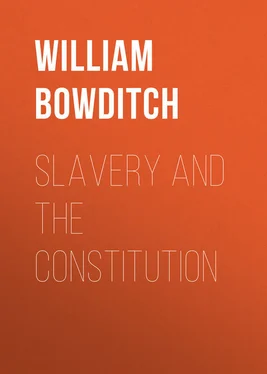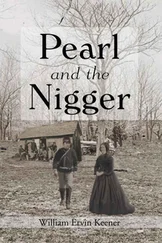William Bowditch - Slavery and the Constitution
Здесь есть возможность читать онлайн «William Bowditch - Slavery and the Constitution» — ознакомительный отрывок электронной книги совершенно бесплатно, а после прочтения отрывка купить полную версию. В некоторых случаях можно слушать аудио, скачать через торрент в формате fb2 и присутствует краткое содержание. ISBN: , Жанр: foreign_antique, foreign_prose, на английском языке. Описание произведения, (предисловие) а так же отзывы посетителей доступны на портале библиотеки ЛибКат.
- Название:Slavery and the Constitution
- Автор:
- Жанр:
- Год:неизвестен
- ISBN:http://www.gutenberg.org/ebooks/38716
- Рейтинг книги:4 / 5. Голосов: 1
-
Избранное:Добавить в избранное
- Отзывы:
-
Ваша оценка:
- 80
- 1
- 2
- 3
- 4
- 5
Slavery and the Constitution: краткое содержание, описание и аннотация
Предлагаем к чтению аннотацию, описание, краткое содержание или предисловие (зависит от того, что написал сам автор книги «Slavery and the Constitution»). Если вы не нашли необходимую информацию о книге — напишите в комментариях, мы постараемся отыскать её.
Slavery and the Constitution — читать онлайн ознакомительный отрывок
Ниже представлен текст книги, разбитый по страницам. Система сохранения места последней прочитанной страницы, позволяет с удобством читать онлайн бесплатно книгу «Slavery and the Constitution», без необходимости каждый раз заново искать на чём Вы остановились. Поставьте закладку, и сможете в любой момент перейти на страницу, на которой закончили чтение.
Интервал:
Закладка:
How far has the existence or utterance of such sentiments as these resulted in securing to the slaves a sound moral and religious instruction? What kind of teachers and what kind of instruction are thought to be consistent with proper feelings of gratitude and humanity on the part of masters? We have just seen the deep moral degradation of the very great majority of the slaves. Still "there are at the present time," says Mr. Jones (p. 100), "tens of thousands connected by a credible profession to the church of Christ, and the gospel is reaching them to a greater extent and in greater purity and power than ever before."
By whom is the gospel thus preached to them in purity and power? Who is it that "ministers unto them in spiritual things," and "leads away their famishing souls to the water of life"?
"Those who would keep the Bible from their fellow-creatures are the enemies of God and man. The Bible belongs of right to every man. It is the property of the world." Thus speaks the Protestant defender of slavery, Charles C. Jones ("Catechism," p. 80). But to prevent a slave from reading the Bible is not by any means to keep the Bible from him! In what a Catholic spirit he thus exhorts the slaves! ("Catechism," p. 79) "What benefit will this precious book be to us, unless we diligently study it, and embrace opportunities of receiving instruction from it, such as are afforded us in the house of God, in the sabbath-school, and in the Bible-class? 'Search the Scriptures' is the Redeemer's command." [E] Конец ознакомительного фрагмента. Текст предоставлен ООО «ЛитРес». Прочитайте эту книгу целиком, купив полную легальную версию на ЛитРес. Безопасно оплатить книгу можно банковской картой Visa, MasterCard, Maestro, со счета мобильного телефона, с платежного терминала, в салоне МТС или Связной, через PayPal, WebMoney, Яндекс.Деньги, QIWI Кошелек, бонусными картами или другим удобным Вам способом.
"We cannot," he says ("Religions Instruction," p. 167), "cry out against the Papists for withholding the Scriptures from the common people, and keeping them in ignorance of the way of life; for our inconsistency is as great as theirs, if we withhold the Bible from our servants, and keep them in ignorance of its saving truths, which we certainly do while we will not provide ways and means of having it read and explained to them"! So readily, at the bidding of slavery, will Protestants surrender the most distinctive feature of Protestantism!
It is obvious, that, if any religious instruction is to be imparted to slaves, it must be given them by others. But it is in the power of the owner to forbid all such instruction. "The whole arrangement of the religious instruction of the negroes, as to teachers, times, places, matter and manner, is in our own power," says Mr. Jones (ib. p. 98).
The Presbytery of Georgia, in the memorial before alluded to, says —
"The law of the land makes and can make no provision for their religious instruction. That instruction is committed to owners, as the instruction of children is to parents; and they can give or withhold it at pleasure . We owners and ministers are 'the almoners of divine mercy to them,' and, if we do not open the door of salvation, they may grope their way into a miserable eternity; for they have no power of any kind to originate and establish and carry forward church organizations and associations for their own benefit. They are entirely dependent upon us for the gospel of salvation."
"We may," says Mr. Jones ("Religious Instruction," p. 158), "according to the power lodged in our hands, forbid religious meetings and religious instruction on our own plantations; we may forbid our servants going to church at all, or only to such churches as we may select for them; we may literally shut up the kingdom of heaven against men, and suffer not them that are entering to go in!"
Wherever an owner is willing to permit such instruction, it must still be carried on wholly by oral communications. "This immense mass of immortal beings," says Mr. Jones, "is thrown for religious instruction upon oral communications entirely " (ib. p. 157). That any oral instruction of the adult or aged slaves is worth but little he evidently admits, because he says (ib. p. 229), "If a people are to be instructed orally, let the instruction be communicated to them in early life;" and "the great hope of permanently benefiting the negroes is laid in sabbath-schools, in which children and youth may be trained up in the knowledge of the Lord." Our minds are so constituted, that, unless our powers of memory have been strengthened by constant or frequent use in youth, we cannot in after-life either receive or retain much benefit from oral instruction. And if this is true of the freeman, how much more is it true of the slave! Consequently, the only method of instructing the slaves, which law or custom or both do not forbid, is the very last, – the poorest method for their real good which can be devised!
There are colored preachers at the South, "and some of them," says Mr. Jones, "are able to read" (ib. p. 175). The following anecdote, illustrative of their capacity to impart knowledge, is told by Charles Lyell. When in Louisville, Ky. he attended a Methodist Church. "The preacher was a full black, spoke good English, and quoted Scripture well." "It appeared," says Prof. Lyell, "from his explanation of 'Whose superscription is this?' that he supposed the piece of money to be a dollar note, to which Cæsar had put his signature."
Some, probably most of them, are slaves. We have now before us the advertisement of a runaway slave who claimed to be a Methodist preacher! The Alabama Baptist Association bought one of its missionaries, named Cæsar, in 1828, and owned him till the time of his death! He lived to be 76 years old. A writer in the "Georgia Christian Index" begins an obituary notice of him thus, "A good colored man has fallen in Israel;" and ends by saying, "The writer can truly say that his labors have been much blest." Mr. Jones gives the names of several other slave preachers. Still, however, they are discountenanced.
The "Revised Statutes" of North Carolina (chap. 111, sec. 34; "Revision of Statute," 1831, chap. 4, sec. 1) provide that —
"It shall not be lawful, under any pretence, for any slave or free person of color to preach or exhort in public, or in any manner to officiate as a preacher or teacher in any prayer-meeting or other association for worship where slaves of different families are collected together; and if any free person of color shall be thereof duly convicted, on indictment, before any court having jurisdiction thereof, he shall for each offence receive not exceeding thirty-nine lashes on his bare back; and when any slave shall be guilty of a violation of this section, he shall, on conviction before a single magistrate, receive not exceeding thirty-nine lashes on his bare back."
In Alabama (Stat. 1832, chap. 8, sec. 24; "Clay's Digest," 545, sec. 35), —
"If any slave or free person of color shall preach to, exhort, or harangue any slave or slaves or free persons of color, unless in the presence of five respectable (!) slaveholders, any such slave or free person of color so offending shall, on conviction before any justice of the peace, receive, by order of said justice of the peace, thirty-nine lashes for the first offence, and fifty lashes for every offence thereafter; and any person may arrest any such slave or free person of color, and take him before a justice of the peace for trial, – Provided that the negroes so haranguing or preaching shall be licensed thereto by some regular body of professing Christians immediately in the neighborhood, and to whose society or church such negro shall properly belong."
Читать дальшеИнтервал:
Закладка:
Похожие книги на «Slavery and the Constitution»
Представляем Вашему вниманию похожие книги на «Slavery and the Constitution» списком для выбора. Мы отобрали схожую по названию и смыслу литературу в надежде предоставить читателям больше вариантов отыскать новые, интересные, ещё непрочитанные произведения.
Обсуждение, отзывы о книге «Slavery and the Constitution» и просто собственные мнения читателей. Оставьте ваши комментарии, напишите, что Вы думаете о произведении, его смысле или главных героях. Укажите что конкретно понравилось, а что нет, и почему Вы так считаете.












